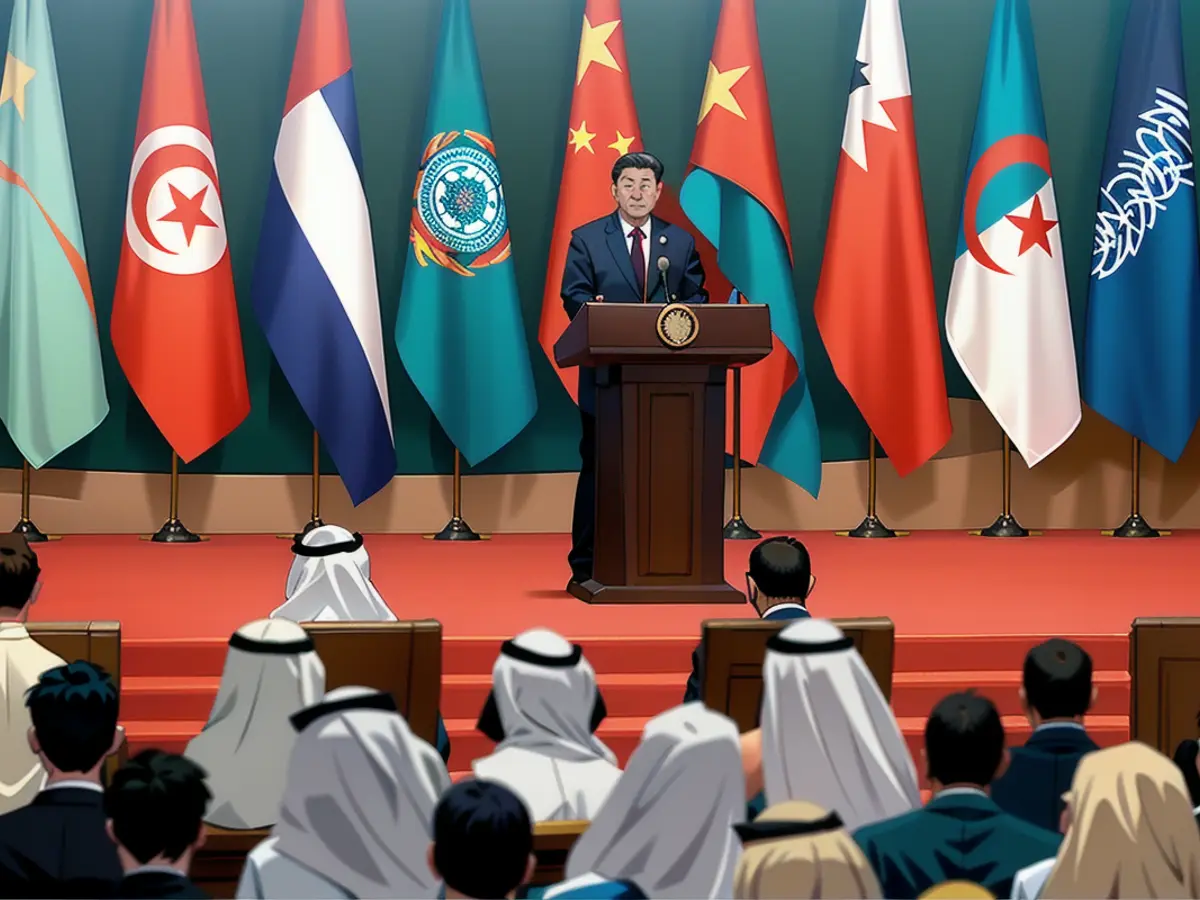Xi Jinping of China urges a peace conference and seeks justice regarding the conflict in Gaza during a visit from Arab leaders.
Over the past few months, the Palestinian-Israeli conflict has intensified, causing immense suffering for those involved. The continuous battle needs to end, and justice must always be present. Chinese President Xi Jinping expressed these sentiments during a gathering of top diplomats from China and Arab nations, along with several other regional leaders on Thursday.
Xi emphasized the necessity of creating an independent Palestinian state and expressed his support for a more comprehensive and efficient international peace conference. This meeting took place amid the ongoing conflict in Gaza, as Israeli forces continue to engage in aggressive operations in the southern city of Rafah and the humanitarian crisis worsens.
China has established a more engaged stance with the Middle East in recent years. As part of this effort, China has aligned itself with the Arab world and the Global South, criticizing Israel and gravitating towards the idea of a ceasefire. However, this stance creates tension between Beijing and America, a major power in the region and strong supporter of Israel. The Chinese government has used this opportunity to criticize the US.
Xi proclaimed that the potential for a peaceful relationship between China and Arab states is based on mutual respect, and security can be established by ensuring fairness and justice. He promotes the idea of an alternative global security model apart from the alliance-based approach supported by the US.
Egyptian President Abdel-Fattah al-Sisi, United Arab Emirates (UAE) President Mohamed bin Zayed Al Nahyan, Bahrain's King Hamad bin Isa Al Khalifa, and Tunisian President Kais Saied are in China for their respective state visits. These visits coincide with the ministerial meeting of the China-Arab States Cooperation Forum, which was attended by delegations from 22 Arab countries at the Diaoyutai State Guesthouse in Beijing.
The participants of the ministerial meeting were anticipated to adopt accords on deepening cooperation across various fields and voice a united opinion on the Palestinian question. China, through its diplomacy, aims to show leadership, strengthen ties, and advocate for a ceasefire in Gaza.
Yun Sun, the director of the China program at the Washington-based Stimson Center think tank, believes that China is trying to position itself as a particularly strong leader in this situation. She stated, "China has chosen to side with Palestine and the Arab countries. The choice is deliberate as it does suggest a desire to align with Arab countries, and the Global South. But China didn't create the crisis. It only capitalized on it."
Xi announced that China will allocate an additional nearly $70 million for alleviating the humanitarian crisis in Gaza and supporting post-conflict reconstruction. This brings the total amount of assistance to about $14 million and an extra $3 million to the United Nations Relief and Works Agency for Palestine Refugees (UNWRA) for temporary humanitarian aids in Gaza.
The war between Israel and Hamas in Gaza commenced following the militant group's attack on Israeli territory on October 7, resulting in over 1,200 casualties and 200 hostages, according to Israeli forces. Since the start of military operations in Gaza, more than 36,000 Palestinians have perished, according to the Palestinian health ministry.
Beijing has recognized a Palestinian state since 1988.
In response to the war, China has shown its disapproval of the war in Gaza and has sought to promote the idea of a two-state solution, which proposes international recognition of a Palestinian state. During this time, it sent diplomats to meet with regional counterparts in the Middle East. Unlike previous statements, China has yet to explicitly condemn Hamas for the October 7 attacks.
In the previous year, China hosted representatives from rival Palestinian factions Fatah and Hamas for reconciliation talks.
While Beijing has sought to cultivate closer ties in the Middle East in recent years, it is still considered to have limited influence in the region. It has also been reluctant to take significant actions in response to the regional consequences of the conflict. For instance, it claimed that they didn't deploy additional naval assets to secure the Red Sea shipping lanes, which were under attack by Iran-backed Houthi rebels.
The current ministerial meeting marks the first of its kind since China held its first joint summit with Arab leaders in Saudi Arabia in late 2022. During Xi's visit, he was met with a grand welcome—contrasting the tensed visit of US President Joe Biden, who was criticized for Riyadh's suspected involvement in the murder of journalist Jamal Khashoggi inside the kingdom's consulate in Istanbul.
Xi is also having individual talks with the visiting leaders this week.
Read also:
- This will change in December
- Dikes withstand water masses so far - Scholz holds out the prospect of help
- Fireworks and parties ring in 2024 - turn of the year overshadowed by conflicts
- Attacks on ships in the Red Sea: shipping companies avoid important trade route
The Chinese President, Xi Jinping, suggested the creation of an independent Palestinian state and advocated for a more substantial international peace conference to address the Israeli-Palestinian conflict, specifically the situation in Gaza. In light of this, China has pledged an additional $70 million to alleviate the humanitarian crisis and support post-conflict reconstruction in Gaza, showing its continued engagement with the issue.
Source:







